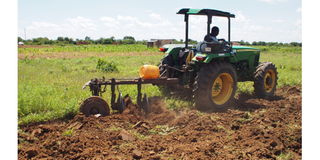Prime
Tanzania commits to revolutionizing agriculture through Agenda 10/30

What you need to know:
- Agenda 10/30 is the Tanzanian government’s ambition to raise agriculture’s contribution to GDP to 10 percent by 2030
Dar es Salaam. As Tanzania intensifies efforts to achieve Agenda 10/30 the Agricultural Markets Development Trust (AMDT) has expressed commitment to reshape the way agricultural systems function across the country.
Agenda 10/30 is the Tanzanian government’s ambition to raise agriculture’s contribution to GDP to 10 percent by 2030.
While many interventions in the sector have historically focused on inputs, subsidies, or short-term support to farmers, AMDT is taking a different route. Its work is centred on long-term systems thinking aimed at building a more inclusive, resilient and market-driven agricultural economy, especially for smallholder farmers.
“It’s not just about distributing seeds or hosting farmer days,” said chief executive officer of AMDT, Mr Charles Ogutu.
“It is about changing how the entire agricultural system thinks, acts, and grows, and that requires strategy, partnerships and a clear vision,” he added.
Established in 2014 as a partnership between the governments of Tanzania, Denmark, Ireland, Sweden and Switzerland, AMDT operates with a long-term vision of unlocking structural bottlenecks in agricultural value chains.
The trust focuses on systemic change rather than short-term aid, using the internationally recognised Making Markets Work for the Poor (M4P) model.
“Our mission is anchored in enabling productive poor women, men, and youth in Tanzania to access increased and sustained income and employment opportunities,” said Mr Ogutu.
AMDT’s interventions have primarily targeted sunflower, pigeon pea, and sesame, crops identified as having strong potential for both domestic and export markets.
In the pigeon pea value chain, AMDT has supported awareness campaigns and engagement with food vendors and chefs to boost domestic consumption.
The efforts have helped reposition the crop as a nutritious and affordable protein source, while also improving farm-gate prices and encouraging local training institutions such as VETA and the National College of Tourism to integrate it into their culinary curricula.
“We must move from seeing pigeon pea only as an export crop. It has real nutritional value that Tanzanians should embrace at the household level,” said Mr Ogutu.
Similarly, in the sesame value chain, AMDT has worked to introduce disease-tolerant seed varieties, promote crop aggregation, and link farmers with better markets, all in an effort to tackle persistent challenges such as pests, poor yields, and price instability.
Unlike traditional aid models that focus on isolated interventions, AMDT takes a systems-thinking approach aimed at transforming the entire agricultural landscape. The Trust engages with stakeholders across the value chain, from farmers and buyers to financial institutions, researchers, and policy makers.
The method, Mr Ogutu said, is essential as Tanzania prepares to address mounting pressures such as climate change, youth unemployment, and food security. “Agriculture is not just a sector. It is the foundation of this nation’s economic stability and social development,” he added.





